
Wilhelm Richard Wagner was a German composer, theatre director, polemicist, and conductor who is chiefly known for his operas. Unlike most opera composers, Wagner wrote both the libretto and the music for each of his stage works. Initially establishing his reputation as a composer of works in the romantic vein of Carl Maria von Weber and Giacomo Meyerbeer, Wagner revolutionised opera through his concept of the Gesamtkunstwerk, by which he sought to synthesise the poetic, visual, musical and dramatic arts, with music subsidiary to drama. He described this vision in a series of essays published between 1849 and 1852. Wagner realised these ideas most fully in the first half of the four-opera cycle Der Ring des Nibelungen.
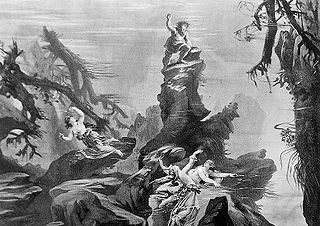
Der Ring des Nibelungen, WWV 86, is a cycle of four German-language epic music dramas composed by Richard Wagner. The works are based loosely on characters from the Norse sagas and the Nibelungenlied. The composer termed the cycle a "Bühnenfestspiel", structured in three days preceded by a Vorabend. It is often referred to as the Ring cycle, Wagner's Ring, or simply The Ring.
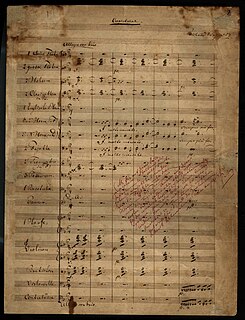
The Flying Dutchman, WWV 63, is a German-language opera, with libretto and music by Richard Wagner. The central theme is redemption through love. Wagner conducted the premiere at the Königliches Hoftheater in Dresden in 1843.
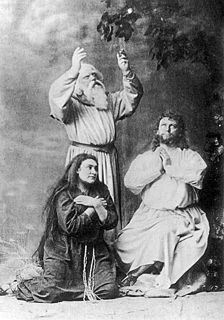
Parsifal is an opera in three acts by German composer Richard Wagner. It is loosely based on Parzival by Wolfram von Eschenbach, a 13th-century epic poem of the Arthurian knight Parzival (Percival) and his quest for the Holy Grail.

"Das Judenthum in der Musik" is an essay by Richard Wagner which attacks Jews in general and the composers Giacomo Meyerbeer and Felix Mendelssohn in particular. It was published under a pseudonym in the Neue Zeitschrift für Musik (NZM) of Leipzig in September 1850 and was reissued in a greatly expanded version under Wagner's name in 1869. It is regarded by some as an important landmark in the history of German antisemitism.
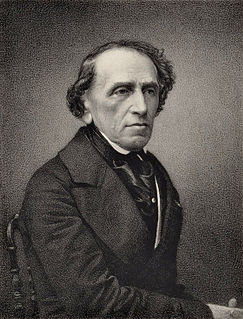
Giacomo Meyerbeer was a German opera composer of Jewish birth who has been described as perhaps the most successful stage composer of the nineteenth century. With his 1831 opera Robert le diable and its successors, he gave the genre of grand opera 'decisive character'. Meyerbeer's grand opera style was achieved by his merging of German orchestra style with Italian vocal tradition. These were employed in the context of sensational and melodramatic libretti created by Eugène Scribe and were enhanced by the up-to-date theatre technology of the Paris Opéra. They set a standard which helped to maintain Paris as the opera capital of the nineteenth century.

The "Ride of the Valkyries" refers to the beginning of act 3 of Die Walküre, the second of the four operas constituting Richard Wagner's Der Ring des Nibelungen.
The Siegfried Idyll, WWV 103, by Richard Wagner is a symphonic poem for chamber orchestra.

Siegfried Helferich Richard Wagner was a German composer and conductor, the son of Richard Wagner. He was an opera composer and the artistic director of the Bayreuth Festival from 1908 to 1930.

Die Hochzeit is an unfinished opera by Richard Wagner which predates his completed works in the genre. Wagner completed the libretto, then started composing the music in the second half of 1832 when he was just nineteen. He abandoned the project and destroyed the libretto after his sister Rosalie, who was the main supporter and the spokesman of the family, expressed her disgust at the story. Today, only three pieces survive from the opera.
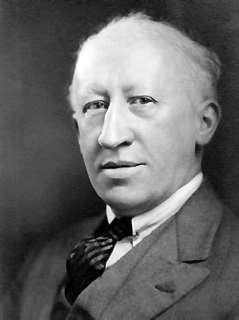
Ernest Newman was an English music critic and musicologist. Grove's Dictionary of Music and Musicians describes him as "the most celebrated British music critic in the first half of the 20th century." His style of criticism, aiming at intellectual objectivity in contrast to the more subjective approach of other critics, such as Neville Cardus, was reflected in his books on Richard Wagner, Hugo Wolf, Richard Strauss and others. He was music critic of The Sunday Times from 1920 until his death nearly forty years later.
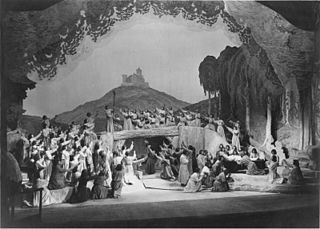
Tannhäuser is an 1845 opera in three acts, music and text by Richard Wagner, based on two German legends: Tannhäuser, the mythologized medieval German Minnesänger and poet, and the tale of the Wartburg Song Contest. The story centers on the struggle between sacred and profane love, and redemption through love, a theme running through much of Wagner's mature work.
The Faust Overture is a concert overture by German composer Richard Wagner. Wagner originally composed it between 1839 and 1840, intending it to be the first movement of a Faust Symphony based on the play Faust by German playwright Johann Wolfgang von Goethe. Realizing that he would not finish the planned symphony, Wagner revised the piece between 1843 and 1844, incorporating ideas from the other planned movements, and creating instead a single-movement concert overture. He made a final revision in 1855. The work is one of Wagner's few compositions intended for the concert hall, rather than the theatre.

Männerlist größer als Frauenlist oder Die glückliche Bärenfamilie is an unfinished Singspiel by Richard Wagner, written between 1837 and 1838.
A bass ( BAYSS) is a type of classical male singing voice and has the lowest vocal range of all voice types. According to The New Grove Dictionary of Opera, a bass is typically classified as having a vocal range extending from around the second E below middle C to the E above middle C (i.e., E2–E4). Its tessitura, or comfortable range, is normally defined by the outermost lines of the bass clef. Categories of bass voices vary according to national style and classification system. Italians favour subdividing basses into the basso cantante (singing bass), basso buffo ("funny" bass), or the dramatic basso profondo (low bass). The American system identifies the bass-baritone, comic bass, lyric bass, and dramatic bass. The German fach system offers further distinctions: Spielbass (Bassbuffo), Schwerer Spielbass (Schwerer Bassbuffo), Charakterbass (Bassbariton), and Seriöser Bass. These classification systems can overlap. Rare is the performer who embodies a single fach without also touching repertoire from another category.
Musikdrama is a German word that means a unity of prose and music. Initially coined by Theodor Mundt in 1833, it was most notably used by Richard Wagner, along with Gesamtkunstwerk, to define his operas.

Ferdinand Praeger was a composer, music teacher, pianist and writer. He is now best known for his controversial biography of Richard Wagner, Wagner As I Knew Him, published in 1892 after Praeger's death.

Der Ring in Minden was a project to stage Richard Wagner's cycle Der Ring des Nibelungen at the Stadttheater Minden, beginning in 2015 with Das Rheingold, followed by the other parts in the succeeding years, and culminating with the complete cycle performed twice in 2019. The stage director was Gerd Heinz, and Frank Beermann conducted the Nordwestdeutsche Philharmonie, playing on the stage of the small theatre. The singers acted in front of the orchestra, making an intimate approach to the dramatic situations possible. The project received international recognition and was compared favourably to the Bayreuth Festival.













